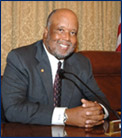“Terrorism Risk Insurance Act (TRIA) Revision and Extension”
September 24, 2007 (WASHINGTON) – Today, Rep. Bennie G. Thompson (D-MS), Chairman of the Committee on Homeland Security, released the following statement in support of H.R. 2761, the “Terrorism Risk Insurance Act (TRIA) Revision and Extension”.
“I rise in support of H.R. 2761, the Terrorism Risk Insurance Act (TRIA) Revision and Extension, as Chairman of the Committee on Homeland Security. This bill necessarily reauthorizes TRIA for 15 years—through 2022. At its essence, TRIA provides a Federal backstop to the insurance industry by providing compensation for a portion of insured losses resulting from acts certified by the Federal government as acts of terrorism. Importantly, TRIA has no cost to the taxpayer unless there is a terrorist attack. This program is not an ongoing subsidy to the insurance industry but, instead, an incident-based program that will help to ensure the continuity of our livelihoods and commerce in the wake of a terrorist incident in the United States.
Mr. Speaker, history has shown that Al Qaeda and other extremist organizations will explicitly direct acts of terror against American citizens and property in an effort to inflict economic harm upon this country. The Congressional Research Service estimated that insured losses from the attacks on the World Trade Center total around $32 billion. This bill helps build resiliency in our country to respond to the known objectives of our adversaries.
As the Committee with oversight of the Department of Homeland Security (DHS), our Committee works diligently to ensure that DHS effectively executes and manages its duties. Since its inception, there has been an understandable focus on the protection of the United States against acts of terror. However, as demonstrated in the wake of Hurricane Katrina, I do not believe that there has been an adequate focus on recovering from the aftermath of a catastrophic incident by the Department. I believe that the extension of TRIA demonstrates our nation’s necessary commitment to planning for the recovery and resumption of economic activity following an act of terrorism. Whereas we can never take our eyes off of protection and prevention, we must show a commitment to resiliency in the wake of an incident. This bill will help our nation begin its climb back to normality should we ever again be struck on our shores by terrorists.
Furthermore, the revision and extension of TRIA represents a vital element of homeland security, particularly in its protection of critical infrastructure: the effective cooperation between the public and private sectors. The Committee on Homeland Security has focused extensively on this necessary partnership and the homeland security solutions that can be achieved by both sectors working together. This necessary partnership will be essential to the successful stabilization of the United States economy at a time of national crisis, should one occur.
Last year, I expressed my concern with the TRIA not requiring insurers to offer coverage from acts of nuclear, biological, chemical, and radiological (NBCR) terrorism. Studies by numerous entities concluded that the risk of NBCR terrorism is essentially uninsurable unless there is a federal government backstop. I am pleased that this legislation includes acts of NBCR terrorism in TRIA and, therefore, provides that federal backstop. This provision will hopefully encourage efforts by the insurance industry while providing it with the necessary support that it needs.
I am pleased that the bill incorporates the Secretary of DHS, especially relating to the certification of NBCR terrorism. It says that where a certified act of terrorism is carried out by means of an NBCR weapon or instrumentality, the Secretary of the Treasury will certify that act as an act of NBCR terrorism. Importantly, if a certified act of terrorism involves any other “weapon or instrumentality,” then the Secretary of the Treasury will consult with the Secretary of Homeland Security, among other officials, to determine whether the act of terrorism meets the definition of NBCR terrorism, as defined by the bill. This language recognizes the ever-changing threat we face as well as the expertise and sophistication of DHS.
It is important that this extension of TRIA will be for 15 years. This long-term extension will enhance economic stability—for example, by bringing more stability to the real estate and construction industries so that they can move forward with large-scale building projects in areas considered at high risk for terrorism. After all, TRIA was enacted in 2002 in an attempt to stabilize the economy that was badly disrupted by the events of 9/11 and to spur commercial development, as well as to prevent an industry-wide catastrophe in the event of another terrorist attack. This 15-year extension will create the predictability and confidence that the private sector needs to make investments that help our national economy.
This legislation will help our country and its industry spur economic development and, importantly, will provide the necessary economic security in the aftermath of a terrorist event to get our country moving as quickly as possible.
In closing, let me thank my colleagues on the Financial Services Committee for their leadership on this legislation, especially my colleagues Chairman Frank as well as Representative Carolyn Maloney of New York.
I encourage my colleagues to support this legislation.”
# # #
FOR MORE INFORMATION:
Please contact Dena Graziano or Adam Comis at (202) 225-9978.

